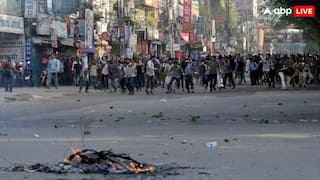Explorer
Decoding heartland mandate: YaMu collapsed, so did SP

Image: PTI/Representational
The just-concluded UP elections demolished the carefully laid caste calculations of both Samajwadi Party and Bahujan Samaj Party. Given the massive slide in their vote shares, it is clear that the parties could not add votes to their core vote banks.
While a lot of data, in the various post-poll analyses, suggests BSP had lost a substantial chunk of its traditional Dalit vote, Samajwadi Party’s performance under Akhilesh Yadav hasn’t yet been analysed fully.
The political test for Akhilesh’s leadership was threefold- retain Mulayam’s legacy and keep Yadavs united under the SP banner; reinforce the Muslim-Yadav vote bank as a strong socio-political alliance on the ground and garner enough support beyond the MY combine to secure a majority in the Assembly. Election results show that the former Chief Minister has not only led the party to its worst ever performance but also reduced the Yadav clout in UP Assembly drastically.
Ever since the emergence of Mulayam Singh Yadav in 1989, the 9 % strong Yadav community has held its sway over UP politics. Although Yadavs number less than Thakurs and Brahmins in the state, in an acutely caste conscious politics, the high concentration in certain pockets makes them a greater political force. Across Uttar Pradesh, there are 21 districts where the Yadav population exceeds 14% whereas in another six districts it is above 12%.
In three districts of Etah, Manipur and Badaun, Yadavs constitute the largest caste group. Of the 35 Yadav MLAs in sixteenth Assembly, 22 came from these districts. In the seventeenth Assembly, however, the total number of Yadav MLAs has reduced to 17. Of these, 13 of them have been elected on SP tickets and 4 on BJP tickets.
In Rohilkhand, Sambhal and Badaun are the two districts with the highest number of Yadav voters. While Mulayam Singh Yadav and DP Yadav had considered Sambhal safe for contesting Lok Sabah elections in past, Akhilesh’s cousin Dharmendra Yadav is the sitting MP from Badaun. In the last Assembly elections, SP had won all 3 seats in Sambhal district and 5 of the 7 seats in Badaun district. The remaining two seats had gone to BSP.
ALSO READ: Decoding Heartland Mandate: Hindu consolidation helped BJP sweep west UP
This time, while BJP’s Gulab Devi defeated Vimlesh Kumari of Congress in Chandausi assembly of Sambhal by a margin of 50000 votes, the major upset was witnessed in Badaun where BJP won 6 out of 7 seats. In Gunnaur, which is the Yadavequivalent of Chhaprauli, voters preferred BJP’s Ajit Kumar Yadav over SP’s sitting MLA Ramkhiladi Yadav.
In Bilsi and Shekhupur, SP was unable to stop the drift of Muslim votes towards BSP’s Muslim candidates. Shekhupur demonstrated the fragility of MY combine where SP’s sitting MLA Ashish Yadav lost to BJP’s Dharmendra Singh after Muslims voted en bloc for BSP’s Mohammed Rizwan. The Turk - Pathan divide in the region, which however could not affect the final outcomes, also demonstrated the ground slipping beneath SP’s feet.
In Poorvanchal (Eastern UP) - Maharajganj, Kushinagar, Faizabad, Azamgarh, Deoria, Balrampur, Gonda Mau, Ballia, Ghazipur and Jaunpur districts account for more than 15% Yadavs. In Chandauli, Basti, Siddarth Nagar, Varanasi, SantRavidas Nagar, Sonbhadra and Mirzapur their percentage hovers around 12.
With Muslim population in Gonda, Balrampur, Sant Kabir Nagar, Siddarth Nagar, Kushinagar and Varanasi ranging between 25 to 30%, SP’s MY combine had always posed a formidable challenge. However, excepting Azamgarh, Jaunpurand Ghazipur Districts, SP was completely routed in the region. In Azamgarh, as against its tally of 9 out of 10, the numbers dropped to 5 out of 10.
Its Yadav MLAs in the district also went down from three to two. Azamgarh was clearly affected by the absence of its sitting MP Mulayam Singh who did not address a single rally there. While in Deedarganj, Yadav support wasn’t enough for SP’s sitting MLA Adil Shaikh to retain his seat, in Mubaraqpur Muslims preferred BSP’s Shah Alam over SP’s Akhilesh Yadav.
ALSO READ: Decoding Heartland Mandate: Ganga shows the way in UP
The shift in Yadav votes from SP to BJP, at whatever limited scale, was again evident in Phoolpur Pawaiseat of Azamgarh. Just like Gunnaur, Yadavs in the constituency preferred the young BJP candidate Arun Kumar Yadav over SP’s sitting MLA Shyam Bahadur Yadav who ended up a poor third behind BSP’s Abul Qais Azmi. In Jaunpur Assembly constituency also the much-touted MY alliance was ruptured with BJP’s Girish Chandra Yadav trouncing Congress’ Nadeem Javed.
It is, however, the districts of Etah, Etawah, Mainpuri, Kasganj, Firozabad, Aurraiya , Kannauj and Farukkhabad in the middle Doab which are properly considered the Yadav belt of UP. The community accounts for more than 14% population in the districts. It is also here that the stakes are highest for SP because the first family of SP hails from the region.
The region had also become significant in the light of family feud threatening to affect party prospects given the open animosity between the two camps.
In the 2012 Assembly elections, SP had swept all the 13 seats in Etah, Etawah, Mainpuri and Aurraiyya. It had won 3 out of 4 seats in Farukkhabad, 2 of 3 in Kasganj and 3 out of 5 seats in Firozabad. This time BJP won all 4 seats in Etah and Farukkhabad; all the 3 seats in Kasganj and Aurraiyya; 4 out of 5 seats in Firozabad and 2 out of 3 seats in Kannauj.
The BJP won Bhogaon seat in Mainpuri and lost the city seat by a narrow margin. The performance gains significance because of the fact that Mainpuri and Kannauj, represented currently by Tej Pratap Yadav and Dimple Yadav respectively, were five of the few 80 seats which bucked the Modi wave in 2014.
Open animosity between Shivpal and Akhilesh camps, rebel candidates and unprecedented non-Yadav OBC consolidation in favor of BJP resulted in shocking results for SP. While in Etah sadar, SP paid for dropping its sitting MLA Ashish Yadav -- considered widely as a politician with a clean image, it had to suffer defeat in Jasrana because of rebellion by sitting MLA Ramveer Yadav who had the tacit support of Shivpal Yadav.
In Shikohabad constituency of Firozabad district, the party had to contend with Ram Pratap Yadav as rebel candidate. Ram Pratap is sitting MP Tej Pratap Yadav’s maternal grandfather. Though Ram Pratap secured only 8,000 votes, the number was enough for BJP’s Mukesh Verma to defeat SP’s Sanjay Yadav.
From the UP Assembly results, it is clear that Akhilesh Yadav who had sought to portray himself as a leader larger than that of Yadavs alone hasn’t been able to hold on to the core vote itself. He has neither been able to infuse confidence among the traditional Muslim-Yadav alliance, nor retain the requisite sympathy of other sections as in 2012. Though he might have inherited the leadership of SP, as a politician, it is still time before Akhilesh could claim the electoral MY legacy of his father.
Author is a long-time observer of UP politics and commentator on current affairs and tweets at @VikasSaraswat
Disclaimer: The opinions, beliefs and views expressed by the various authors and forum participants on this website are personal and do not reflect the opinions, beliefs and views of ABP News Network Pvt Ltd.
Follow Blog News on ABP Live for more latest stories and trending topics. Watch breaking news and top headlines online on ABP News LIVE TV
View More



























